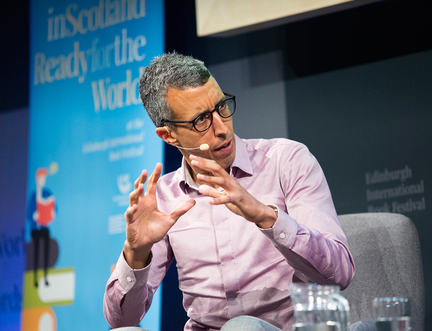More articles Monday 13 August 2018 4:00pm
Capitalism needs a new narrative to survive says BBC’s Economics Editor Kamal Ahmed

Capitalism has failed in its central promise of protecting people’s incomes, according to the BBC’s Economics Editor Kamal Ahmed. Speaking today with fellow BBC journalist Allan Little during a sold-out keynote event at this year’s Book Festival, Ahmed highlighted the “incomes issue” as the big challenge for countries like Britain.
“There have only been three elections since the Second World War where real incomes have been falling: 1945, after the enormous horrors and the economic calamities that a world war creates; 2010, and 2017. Of these three elections, two have been in the last eight years. For seven out the last 10 years, the incomes of millions of people have been falling.
“And I’ve said that surely one of the promises of capitalism is that, if you work hard and play by the rules, in December you should be slightly better off than you were in January,” he added. “For many years since the financial crisis [of 2008], that simply hasn’t been true.
“Capitalism has simply failed in its central promise; you might put up with inequality, with vast salaries for the people at the very top of the corporate world, if you believe that you, your family and friends can get on and can feel a little better by stint of the sweat of your brow. That has ceased to be true. And you can trace from that many of the political issues that have come afterwards, because many people are dissatisfied with the system.”
It is now possible, he believes, to ask – at least with the likes of Britain – if capitalism has “hit the buffers”. As Ahmed explained, his mother’s post-War generation believed that a triumvirate of the State, organised labour (by way of the Trade Union Movement), and business could provide an economy that worked for people. “I think our generation, post-1979, was a reaction against that consensus, driven by the idea that it wasn’t the State that would provide, but rather the market, and that the market needed to be given a freedom to do that. Politically those ideas were taken forward in particular by President Ronald Reagan [in the US] and Margaret Thatcher in Britain.
“For my children, who are 18 and 14, I think it is unclear, when they think about the world around them, who will provide for them,” he said. “I think the 21st century challenge for mature capitalist democracies is to create a new narrative that people – especially younger people – can trust or will trust.
“I think that has been the great struggle for governments and economists, and others, to make a coherent argument about what replaces the consensus of 1979 to 2008,” he added. “Now there is some clever thinking in these areas, but if those answers aren’t found and aren’t discussed, how is it that we can challenge the flow of wealth to assets rather than to income which, over the last 10 years, has meant our labour has become less valuable?”

 Major new partnership with Celtic Connections
Major new partnership with Celtic Connections 

